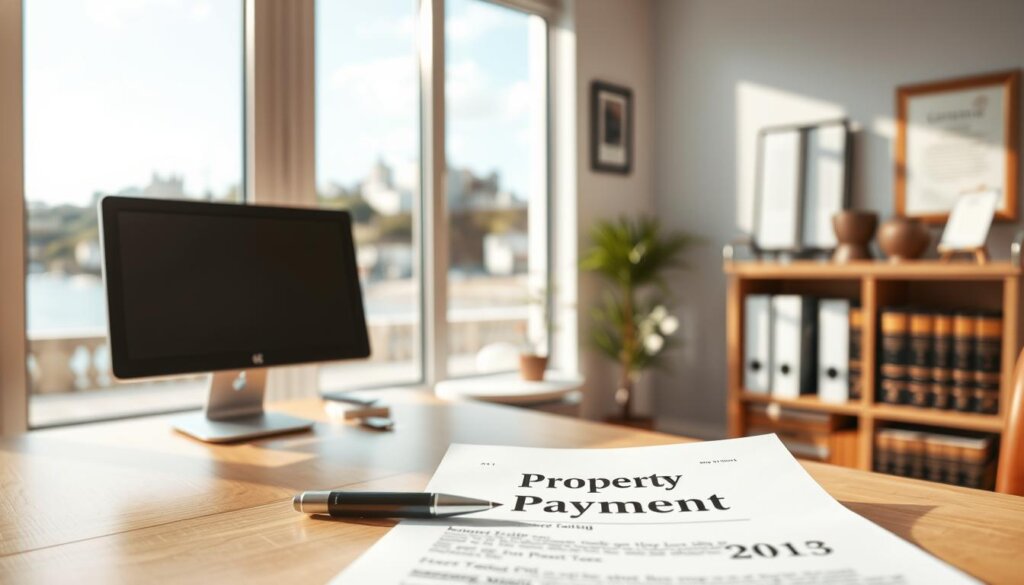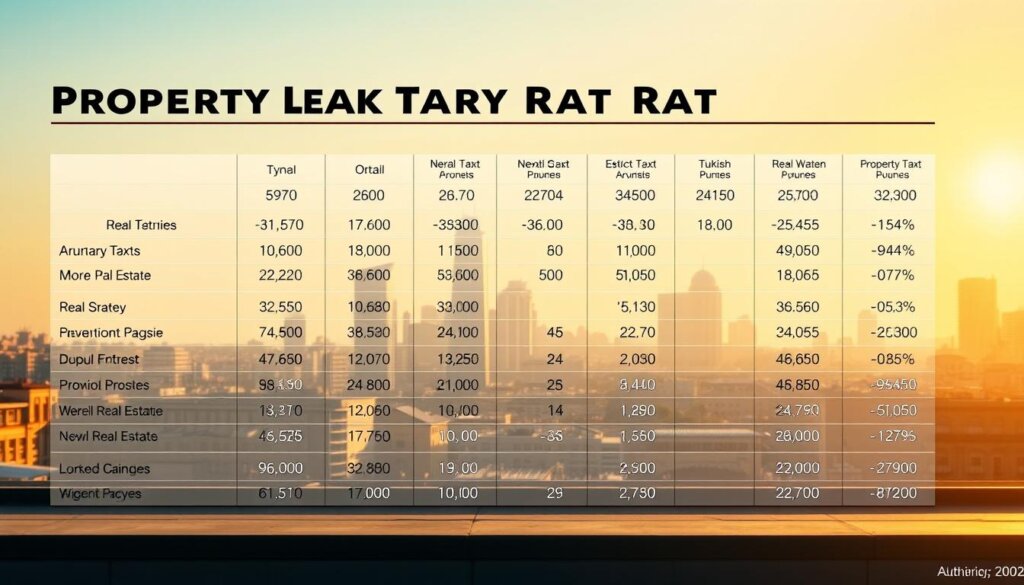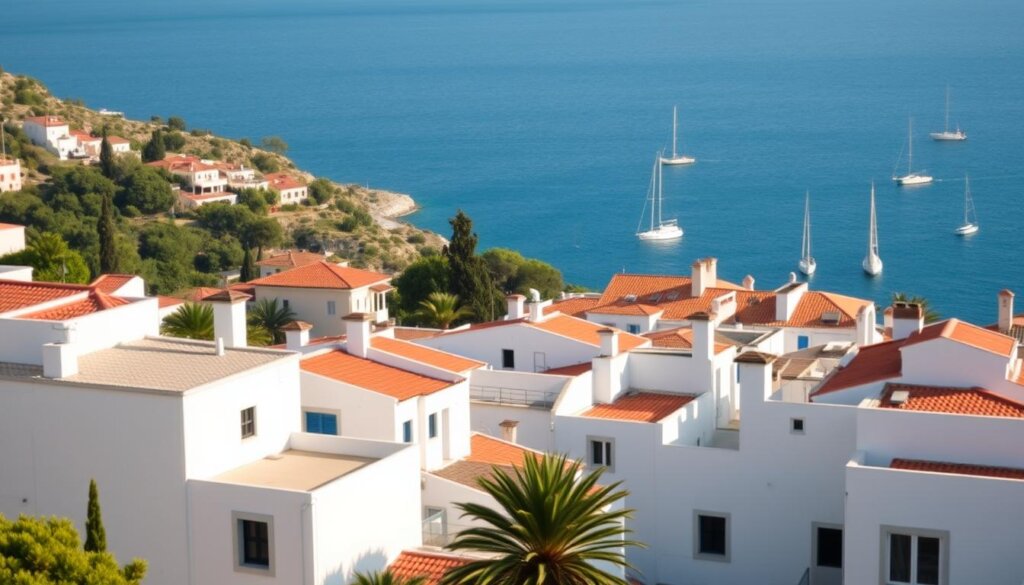Did you know that nearly 40% of international buyers underestimate annual ownership costs when purchasing Turkish real estate? This oversight often stems from unfamiliarity with local tax structures – a critical factor for anyone eyeing Kalkan’s luxury villas or seaside apartments.
Table Of Content
- Key Takeaways
- Overview of the Kalkan Property Market and Tax Landscape
- Why Global Buyers Keep Coming Back
- Understanding Your Fiscal Duties
- Understanding Property Taxes in Kalkan Turkey
- Legislation That Shapes Your Payments
- Payment Processes and Schedules for Property Taxes
- Annual Payment Deadlines and Installment Options
- Online and Municipal Payment Methods
- Property Tax Rates Across Different Property Types
- Residential, Commercial and Land Tax Rates
- What Shapes Your Final Bill?
- Additional Costs and Capital Gains Considerations
- Upfront Fees Every Buyer Should Anticipate
- Profit Margins and Tax Breaks
- Conclusion
- FAQ
- How often do I pay council taxes on a Kalkan holiday home?
- What’s the difference between tax rates for villas and apartments?
- Can foreign buyers claim capital gains exemptions?
- Are there hidden fees beyond the basic property tax?
- How does the 2023 valuation system affect tax calculations?
- What payment methods do local councils accept?
- Do rental incomes get taxed differently for foreign owners?
Nestled along the Turquoise Coast, Kalkan blends historic charm with modern comforts. Its whitewashed homes and panoramic Mediterranean views attract buyers seeking both lifestyle upgrades and investment opportunities. But as I’ve learned through 18 years guiding clients here, overlooking tax obligations can turn a dream purchase into a financial headache.
This guide clarifies everything from annual payment schedules to lesser-known fees. Whether you’re buying a holiday home or a rental asset, understanding these rules ensures you keep more of your investment returns. For personalised advice, feel free to contact me directly at Aydın Çakır +90 532 577 87 67.
Key Takeaways
- Kalkan’s property market offers scenic luxury homes but requires careful tax planning
- Turkish tax laws apply equally to domestic and international buyers
- Annual payments depend on property size and location
- Legislation changes frequently – up-to-date knowledge is essential
- Our detailed guide breaks down payment processes and deadlines
Overview of the Kalkan Property Market and Tax Landscape
Over 60% of buyers I’ve worked with choose this coastal gem for its unique combination of lifestyle benefits and appreciating asset values. Let’s explore what makes this market tick – and why fiscal awareness matters as much as sea views.
Why Global Buyers Keep Coming Back
Kalkan’s cobbled streets and hidden coves create an irresistible blend of authenticity and exclusivity. The average price for sea-view homes has risen 22% since 2020, outpacing many Mediterranean rivals. Buyers particularly value:
- Private access to pebble beaches
- 15-minute drives to Patara’s ancient ruins
- Growing international school options
Understanding Your Fiscal Duties
As part of Antalya province, Kalkan follows regional tax structures. Residential rates sit at 0.1% of declared value, while commercial spaces incur 0.2%. Land plots carry 0.3% – crucial for those considering development projects.
Payment deadlines align with municipal cycles, typically falling in May and November. Late payments attract 2.4% monthly interest, making calendar reminders essential. I always advise clients to “treat tax planning like villa viewings – start early and double-check details”.
For personalised guidance on balancing market opportunities with fiscal responsibilities, reach out directly: Aydın Çakır +90 532 577 87 67. Let’s turn your Mediterranean vision into a stress-free reality.
Understanding Property Taxes in Kalkan Turkey
Getting to grips with fiscal responsibilities separates savvy investors from those facing unexpected bills. Turkey’s tax framework applies uniformly across regions, but local valuation practices create unique considerations here.
Legislation That Shapes Your Payments
Current laws structure annual charges like this:
| Property Type | Tax Rate | Location Impact |
|---|---|---|
| Residential | 0.2% | +15% for sea views |
| Commercial | 0.4% | +10% near town centre |
| Land Plots | 0.6% | Variable by zoning |

These percentages apply to your home’s official valuation, which municipalities reassess every four years. Coastal areas saw 18% average increases last revision – something to factor into long-term budgets.
Rental earnings follow different rules. Owners declaring holiday lettings pay 15-35% income tax, depending on annual profits. As one client learned: “That Airbnb side hustle? It needs proper accounting”.
Recent tourism growth complicates matters. Rising visitor numbers push up valuations in popular areas, though exemptions exist for historic buildings. The 2023 Municipalities Act introduced stricter penalty clauses too – now 3% monthly interest on late payments.
Need help deciphering the latest rules? I’ve helped 270+ buyers align their investments with Turkish law. Let’s discuss your situation over a çay: Aydın Çakır +90 532 577 87 67.
Payment Processes and Schedules for Property Taxes
Managing ownership costs efficiently starts with understanding payment timelines. I’ve seen too many owners scramble last-minute – let’s break down how to stay organised.

Annual Payment Deadlines and Installment Options
Mark your calendar: bills arrive in May and November each year. You’ll choose between:
- Single payment (1% discount if settled by 31 May)
- Two instalments (half by May, remainder by November)
Miss a deadline? Late fees add 2.4% monthly interest. One client paid £127 extra last year – enough for a weekend in Istanbul!
Online and Municipal Payment Methods
Nearly 80% of my clients now use digital platforms. The municipality’s portal accepts:
- International credit/debit cards
- Bank transfers (IBAN details provided)
- E-wallet services like PayByPhone
Prefer face-to-face? Visit the Antalya tax office weekdays 8:30-17:00. Bring your Turkish tax number and property deed copy.
“Setting phone reminders changed everything – no more panicked calls to Aydın!”
Need help navigating payments? Let’s create your personalised schedule. Reach me directly: Aydın Çakır +90 532 577 87 67.
Property Tax Rates Across Different Property Types
Owners often ask me why their neighbour pays less annually – the answer usually lies in property categories. Let’s break down how your villa, flat, or land plot determines your yearly bills.

Residential, Commercial and Land Tax Rates
Turkey applies three main brackets:
| Category | Base Rate | Example |
|---|---|---|
| Homes/Villas | 0.2% | £400/year on £200k valuation |
| Shops/Offices | 0.4% | £1,200/year on £300k café |
| Undeveloped Land | 0.6% | £1,800/year on £300k plot |
These percentages apply to your official valuation. A client’s seafront villa recently got reassessed at 22% higher than inland homes – that’s £528 extra annually!
What Shapes Your Final Bill?
Four key elements affect calculations:
- Location: Coastal areas add 15-25% premiums
- Title deed status: Updated records prevent valuation disputes
- Market trends: Tourism surges pushed up 2024 rates near beaches
- Usage type: Holiday lets face income tax on top of base rates
One buyer saved £1,140 by challenging an outdated valuation report before purchase. As I always say: “Check those documents twice – it’s cheaper than complaining later”.
Need personalised calculations? Let’s review your options over WhatsApp: Aydın Çakır +90 532 577 87 67.
Additional Costs and Capital Gains Considerations
Smart budgeting goes beyond base rates – I’ve seen too many buyers forget about extra charges that can add 6-8% to initial outlays. Let’s unpack what really shapes your total spend.

Upfront Fees Every Buyer Should Anticipate
New owners often gasp at the 4% title deed fee. Here’s what I remind clients:
- First-time buyers pay 1% VAT if purchasing from developers
- Resale homes skip VAT but incur higher deed charges
- Notary fees average £350-£500 per transaction
One couple nearly missed their completion date last year because they forgot the £1,200 surveyor fee. Don’t let that be you!
Profit Margins and Tax Breaks
Sell within five years? Capital gains tax hits hard:
| Profit Bracket | Tax Rate |
|---|---|
| Up to £25k | 15% |
| £25k-£50k | 20% |
| Over £50k | 25% |
First-time purchasers get relief – no VAT on new builds and 50% capital gains exemption if selling after three years. As one client put it: “That exemption paid for our pool installation!”
Need help crunching your numbers? Let’s create a personalised cost breakdown. WhatsApp me anytime: Aydın Çakır +90 532 577 87 67.
Conclusion
Owning a slice of Mediterranean paradise comes with clear financial responsibilities – and rewarding opportunities. Through 18 years of helping buyers, I’ve seen how understanding local rates and payment cycles protects both budgets and peace of mind.
Remember these essentials: annual bills vary between 0.2% for homes and 0.6% for land. May and November deadlines demand attention, while title deed transfers add 4% upfront. Capital gains hit hardest if selling within five years – plan accordingly.
Kalkan’s charm isn’t just in its sun-drenched villas or rental potential. It’s in making informed choices that let you enjoy both lifestyle and returns. Whether you’re eyeing a family home or seaside investment, balancing costs against rewards remains key.
Got questions about specific rates or purchase processes? Let’s chat over a proper Turkish coffee. Please contact me directly for tailored guidance: Aydın Çakır +90 532 577 87 67. Here’s to smart investments that spark joy – not surprises!
FAQ
How often do I pay council taxes on a Kalkan holiday home?
You’ll pay annually, with deadlines typically in May and November. Most owners split payments into two instalments. Late payments incur a 10% penalty, so I recommend setting reminders or using automatic bank transfers.
What’s the difference between tax rates for villas and apartments?
Villas with private pools generally face higher rates – around 0.2% of the declared value versus 0.1% for standard apartments. However, sea views or premium locations can increase values (and therefore taxes) by 15-30% in some neighbourhoods like Kışla or Komurluk.
Can foreign buyers claim capital gains exemptions?
Yes, if you hold title deeds for over five years. First-time purchasers also benefit from reduced stamp duty (currently 1.5% vs 4% for commercial assets). I’ve helped clients structure purchases to maximise these savings – proper planning matters.
Are there hidden fees beyond the basic property tax?
Budget 4-6% extra for mandatory costs: title deed transfer fees (2%), mandatory earthquake insurance (DASK), and waste tax. For £200,000 homes, this adds £8,000-12,000 upfront. I provide itemised breakdowns during purchase consultations to prevent surprises.
How does the 2023 valuation system affect tax calculations?
Municipalities now use algorithm-based valuations combining square metre rates (avg. £700-£1,200/m² in Kalkan) and location multipliers. Disputes must be filed within 30 days of assessment – I recently helped a client reduce their valuation by 18% through documented comparisons.
What payment methods do local councils accept?
p>A: Most transactions now happen online via the Government’s e-tax portal, though Kaş Municipality still processes in-person payments. I guide clients through both systems – including obtaining foreign taxpayer IDs, which take 3-5 working days to activate.
Do rental incomes get taxed differently for foreign owners?
Yes, rental profits face 15-35% income tax brackets. However, you can deduct management fees, maintenance costs, and depreciation. One client offset 40% of their tax bill through legitimate deductions last season – proper record-keeping is essential.







No Comment! Be the first one.